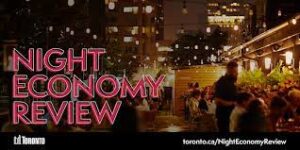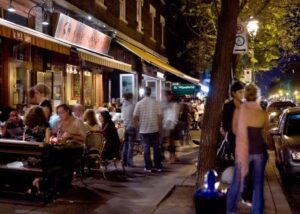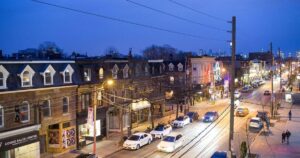
A Night Time Economy program featuring longer bar and club hours is forging ahead in South Etobicoke.
A plan to introduce a Night Economy Program for longer bar, restaurant and nightclub hours in Mimico, New Toronto, Long Branch and other areas is forging ahead with the City’s blessings.
The issue was considered by City Council on December 14 and even though it was supported by many councillors, it was sent for more study.
There will be a first annual Night Time Economy Town Hall on January 17 to ‘connect with fellow night economy enthusiasts, share ideas and discuss strategies to enhance the vibrant nightlife in Toronto.’
The City is reviewing the licensing and zoning regulations for restaurants, bars and entertainment venues, including nightclubs and live music venues, and exploring strategies to support and enhance Toronto’s Night Economy.
Officials want one bylaw across the City instead of a hodge podge of them which resulted when the city was amalgamated.
The move would see more bars and nightclubs with live music and dancing opened until 4 a.m. with special permits, to accommodate those who are night owls or work shifts.
Long Branch, New Toronto, Mimico and part of the Dundas street strip would fall into these all-night zones.
Long Branch residents have said they are against the loud noise, drunkenness and potential crimes that may occur with the changes.
The plan would lead to later TTC operations and access to toilets to cater to the late-nighters.
The City said the Night Economy accounts for an estimated 300,000 jobs in all activities between dusk and dawn. They include dining, community and special events, performing arts, recreation, live music, festivals, shift work, retail, transit and emergency services.
“Toronto’s night economy provides employment opportunities, cultural activities, and entertainment experiences to residents and visitors, while also creating hundreds of thousands of jobs across numerous sectors,” the City said in a report.

The Night Time Economy will lead to longer TTC operations and will require more access to toilets for the late-nighters.
The report said ‘enhancing and safeguarding the experiences of Torontonians between 6 p.m. and 6 a.m. not only improves civic pride and sense of well-being, but also strengthens Toronto’s position as a leading global economic and cultural jurisdiction.’
“A healthy night economy that supports the needs of residents, visitors, and workers requires a proactive municipal approach to lay the groundwork for nighttime business and culture to thrive,” the report state.
It said more than 3,000 people were heard in consultations which have been taking place since 2016. They targeted outreach to Indigenous, Black, racialized, and equity-deserving communities, including women, 2SLGBTQ+, youth, people with disabilities and people who live with low incomes.

Some 300,000 people work in the Night Time Economy and more will be employed if the plan goes through, according to the City.
The report said Torontonians participate strongly in hospitality and arts at night: 92% go to restaurants, 85% to bars, 82% to live music, and 73% to cinema, theatre, and comedy.
The City said the move is meant to bring more business and revenue to outlying areas, rather than downtown Toronto alone.
Night Club Locations going to City Council also includes The Queensway from Mimico Creek Valley to Kipling Avenue; Etobicoke Centre, which includes Bloor Street West and Islington Avenue and Thistletown, including Albion Road and Islington Avenue.
The matter will go back to City Council for approval.


